The science behind comfort zone and how to break it.
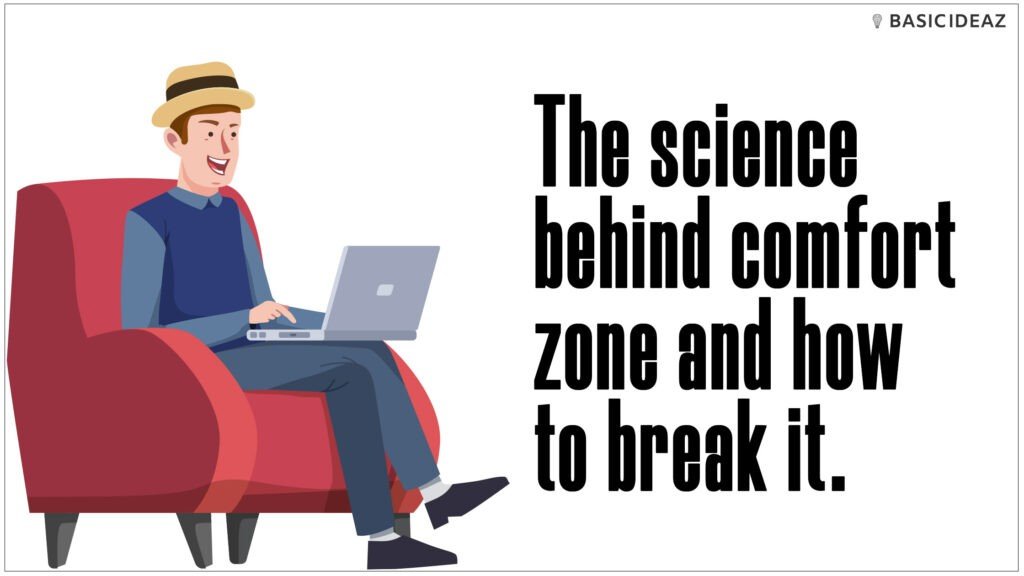
“ Life begins at the end of your comfort zone ” this motivational quote is very popular. But, do we really understand what a comfort zone is? Does getting out of your comfort zone really means getting out of your routine?
I will say an astounding No.
We try to break our comfort zone and to reach the area where the magic happens.
Every day we face uncomfortable situations like seeing your crush but couldn’t speak, presenting a report in front of the whole employees we don’t like, attending a family party which we hate, writing 3000 words in a day where we can only write 500, going to the gym instead of watching t.v or give a public speech which we are scared of, etc.
The examples will go on.
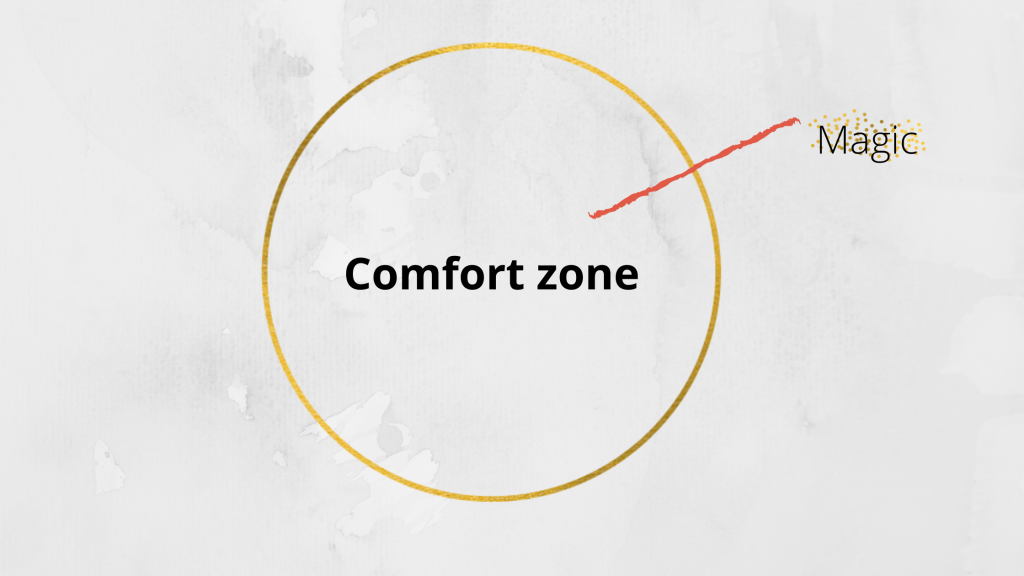
Whenever we think about the comfort zone a circle appears in our head and we imagine breaking the circumference of the circle is what is getting out of our comfort zone.
There is nothing wrong with presenting the comfort zone in a visual presentation.
But, the comfort zone is anything more than a circle.
You cannot break your comfort zone. You can only expand it.
The things you will learn in this article are given below:
Let’s begin.
1. What is a comfort zone?
A comfort zone is an understanding of your brain for a particular thing. It is the neural pathways in your brain which have been created by your life experiences for that particular thing.
This sounds complicated.
Let’s understand this with two examples:
a) Anxiety based comfort zone:
You were asked to give a public speech in the upcoming fresher’s social program. You never gave a public speech before. This sudden request started giving you anxiety and stomach pain.
Your comfort zone lies on the back of the mic, not in front of it.
This is an anxiety-based comfort zone and this is what we generally understand about our comfort zone.
My question is, why did it happen?
Your brain is unfamiliar with the process of giving a speech in public. You never did it before, or perhaps you did it once or twice in school. There are weak or almost no neural pathways created in your brain for public speaking. Strong neural pathways are created by the repetition of a particular thing.
Moreover, your brain identifies it as risky because there is a chance of being ridiculed by the audience if you fail. This produces anxiety and you say, I am not comfortable about speaking in public.
If you want to know about neural pathways, I have described in details in the below article:
The complete guide to human habits and how to build one.
b) Non Anxiety based comfort zone:
You wanted to play chess against your brother. You never played chess before, on the other hand, your brother is a pro in chess.
After losing several matches, you are frustrated and angry but because of your strong willpower, you decide to play once more. You lose again.
You take the chessboard and throw it out of the window. The hell with it.
There will be no anxiety in learning or playing against your brother. He is your brother, not an undertaker.
But, you still lose because there are no neural pathways in your brain created before for chess.
But, that doesn’t back you off because you are motivated to play with your brother. Chess is supposed to be fun, that’s what everybody says.
You realize, it is not fun to lose over and over again against your brother.
Your comfort zone is watching the game not playing it.
2.What is the science behind your comfort zone:
Life begins at the end of your comfort zone is an overstatement. Life begins within your comfort zone.
Let me prove this.
As in the previous examples, we understand that whenever our brain confronts something unfamiliar or less familiar with a particular activity or behavior we become uncomfortable.
You are not comfortable swimming because you never learned swimming before. You cannot cook, because you never cooked before.
Obviously, some activities are more difficult to master than learning how to broom your room. There are hard skills and soft skills. We will not go to that.
To understand the brain activity of a comfort zone we have to understand what mental representation is.
What is mental representation?

Anders Ericsson (born 1947) a Swedish psychologist and Co-author Robert pool, described mental representation with a study on blind chess. It was known that the grandmasters, given just a few seconds to study a chessboard in the middle of the game can remember correctly the positions and play the whole game without looking at it. So, does that mean their memories are better than others?
To understand mental representation, in the 1970s researchers, Herb Simon and Bill chase, tested a national-level champion, a mid-range chess player, and a chess novice on two types of chess boards.
One arranged in a pattern taken from a real chess game and the other was just a random jumble which made no sense of a chess game.
When shown the first arrangement of pieces of the chessboard to the players, the national champion remembered two-third of it, the mid-level remembered more than the novice but less than the champion and the novice did the worst.
Again, when the jumbled chessboard was presented, the novice remembered even less than the previous one. What was interesting was that the champion and the mid-range player too didn’t remember much of the positions of the pieces.
What did this study have to do with the comfort zone?
The answer is everything.
When we practice a certain activity for a long period of time, our neural pathways in the brain grow stronger, new connections are formed, and for that, there will be more grey matter in our brain for that particular section.
The national-level champion develops more grey matter for the game of chess in their brain than a novice. He would be more familiar with the various patterns of the chess game. The mental representation of the patterns of the game was broader than the novice and the mid-range player.
But, when the national-level champion saw the jumble board without any pattern he couldn’t remember much. He was out of his comfort zone.
Gordon Ramsay, the chef, has a better mental representation of cooking than normal people. Sachin Tendulkar has a better mental representation of Cricket than people like us.
The point is the better your mental representation of a certain activity is, the bigger your comfort zone is for that particular activity.
Staying out of your comfort zone means trying to broaden your mental representation.
My question is if our brain knows that staying out of the comfort zone creates better mental representation than why it is so difficult to stay out of our comfort zone?
Why is it so difficult to stay out of your comfort zone?
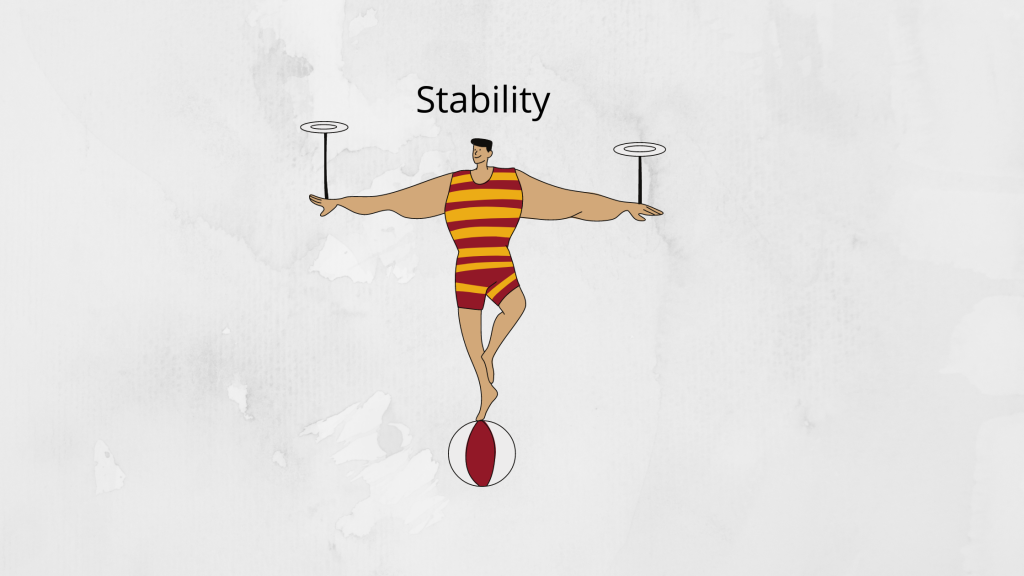
Let’s understand this with homeostasis. What the heck is Homeostasis?
In the same book, Peak, it is mentioned that the human body has a preference for stability. The glucose level, blood pressure, heart rate remains stable to support life. Of course, it is not static as heart rate increases if we go for a run or do a few push-ups.
But these changes are temporary and the body eventually stabilizes. This is called Homeostasis which is a self-regulating process by which biological systems tend to maintain stability while adjusting to conditions that are optimal for survival.
Our brain is like that. It likes to stay in our comfort zone. If we push the boundaries of the comfort zone, it means we are experiencing something less or unfamiliar in our life.
When the lockdown was announced because of the Corona pandemic, I got scared when I saw the empty roads and empty shopping malls.
My brain never experienced it before. But, as in Homeostasis, our body goes back to our normalcy by adjusting the situation, my brain got familiar with the empty road within a few days and the anxiety disappeared.
In the anxiety-based comfort zone, our anxiety stops us from trying something new. The unfamiliarity or a bad past familiarity or experience will create anxiety in our body for which we don’t like to step out of our comfort zone. The bigger the anxiety the bigger the resistance. These are basic knowledge.
In the non-anxiety based comfort zone, motivation plays a huge role. When our motivation is high, going out of the comfort zone is easy. We try new things, travel various new destinations, and do unexpected things. But, the problem with motivation is once the new thing becomes familiar we start to lose the motivation about it.
Once, a habit emerges from a particular activity, we feel less motivated about it.
There are lots of cases where we start our diet and stop after a few days, join a gym and stop going after a few weeks, etc.
I talked about motivation in my last blog and how depending on motivation affects our daily activity.
Again no motivation to work? You should read this.
So, now the important question for which you all are here.
One of the best books I came across to break comfort zone is Peak: Secrets from the New Science of Expertise by K. Anders Ericsson which also helped me to improve my level of productivity.
NOTE:* These are affiliate links. If you purchase something from these links, I will earn a small commission on your purchase.
How to Expand our comfort zone/ How to get out of your comfort zone?
Breaking your boundaries is as wrong as life begins at the end of your comfort zone. You cannot break something that you know or didn’t know and stand outside of it. It sounds preposterous.
You can expand it. The bigger your comfort zone, the better your mental representation and better success in life.
What if you are comfortable with public speaking in front of everyone, what if you are comfortable going to the gym every day and what if speaking with strangers, especially the opposite gender is like a piece of cake.
There are people like this, and they are not out in their comfort zone, but in their comfort zone. Their comfort zone is bigger for the above activities are bigger than others.
The way to expand your comfort zone is Small practices.
This is a big topic and this article is a part of that topic. I will try my best to describe it as much as possible in this blog.
Small Practices:

If you throw a cat on the snow for the first time, which doesn’t like wet and cold, will jump and run back to your house. It will shock her brain. What was that stuff? Cold, wet, and white. Scary.
The next day if you place the cat only on the porch, she will look at the snow at first, curious, then move a little and stand beside it. She will try to touch the snow with her leg and try to feel for it.
Sure, it doesn’t look dangerous now.
After some time, she will walk on the snow and maybe she will start enjoying it.
The secret to expand your comfort zone is small practices
Don’t go for 3000 words a day. You will fail. You will feel depressed and low when you cannot meet your goals.
Instead, after finishing your 500 words, just plan to write 50 more words if you don’t feel like writing.
You have reached the circumference of your comfort zone, the brain has never worked after 500 words. But, there is one thing that can force your brain to continue.
Your will power.
50 words more, will not take much of your will power to write. But, the point here is not writing the 50 words.
When you begin again, most of the time you will find the intrinsic motivation or in other words internal motivation to pursue. You will have positive emotions because you wrote your 500 words, plus an additional 50 words and you will feel good about it.
Because of this, you will write more than 550 words.
Intrinsic motivation depends on our utilization of our dopamine. If you’re watching adult movies or doing drugs, then there will be less or no motivation at all to do anything in life. You will be dead from inside. This is a topic for a different blog.
When you have a comfort zone of 550 words, go for an additional 50 words which will not be that difficult for your bonus raps.
Practice small, one inch at a time. Don’t depend on motivation or willpower. Both will fail you. It depends on small practices, where negligible willpower is required.
The point is creating a habit that is similar to broadening our mental representation and which is also similar to expanding our comfort zone.
Conclusion
So the quote Life begins at the end of your comfort zone may not sound as appropriate now, but it does have a significant meaning. Doing the unpleasant will make our life easier as we will experience new areas of our life. But, that doesn’t mean to jump in it with your both feet.
I have included various topics in this article which I tried to compress within a few pages but the topics itself are big and each topic may take several pages to explain.
To understand better what mental representation is, you can go for the book, Peak as I mentioned above and read the other articles for better understanding.
If you like this article please, feel free to share it with your friends and family. I will appreciate it a lot.
Good luck.
Get Quality Self Improvement Articles Every Week, No Spam, No Ads.
Thank you!
You are added to the community of Basicideaz.

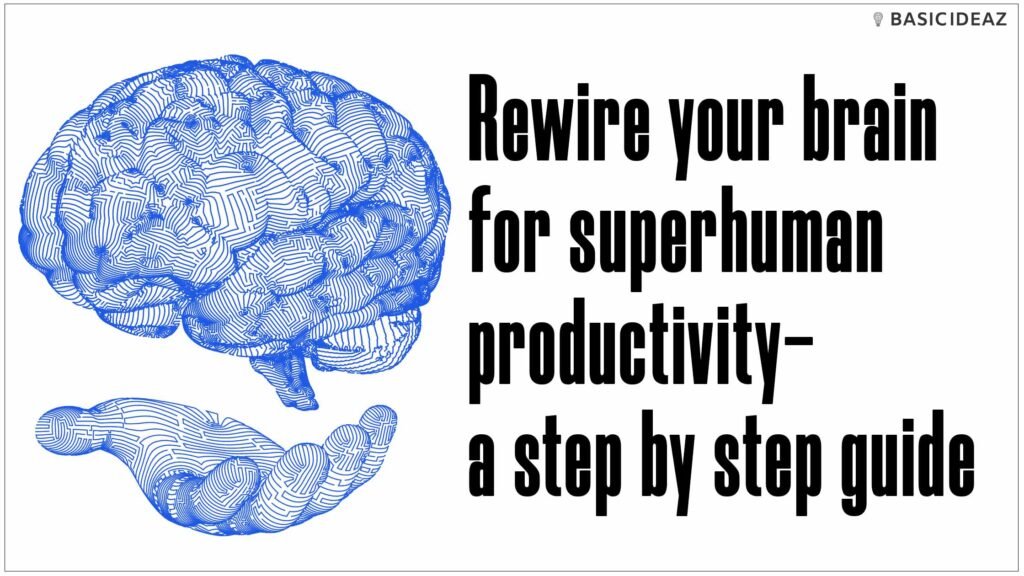
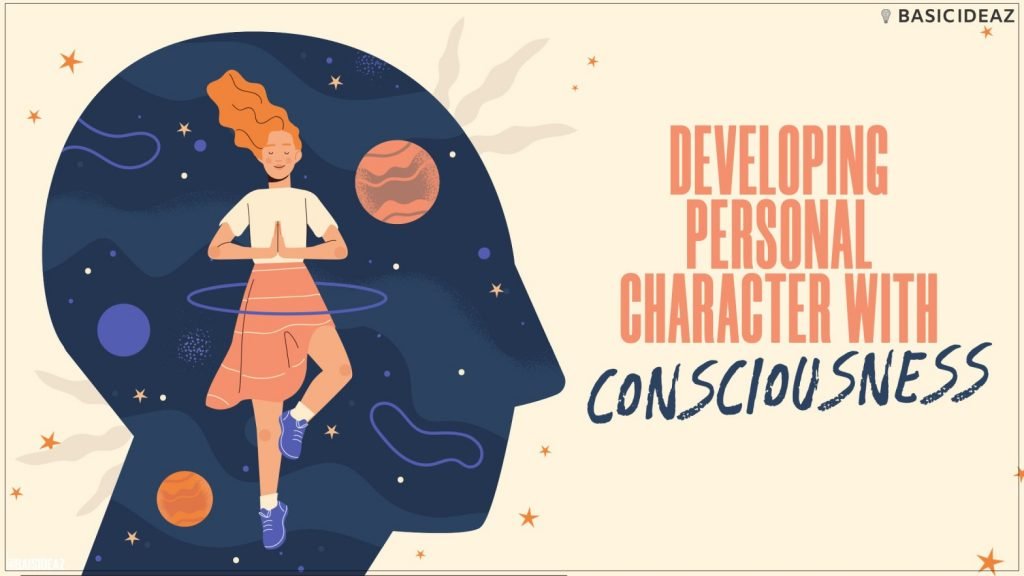
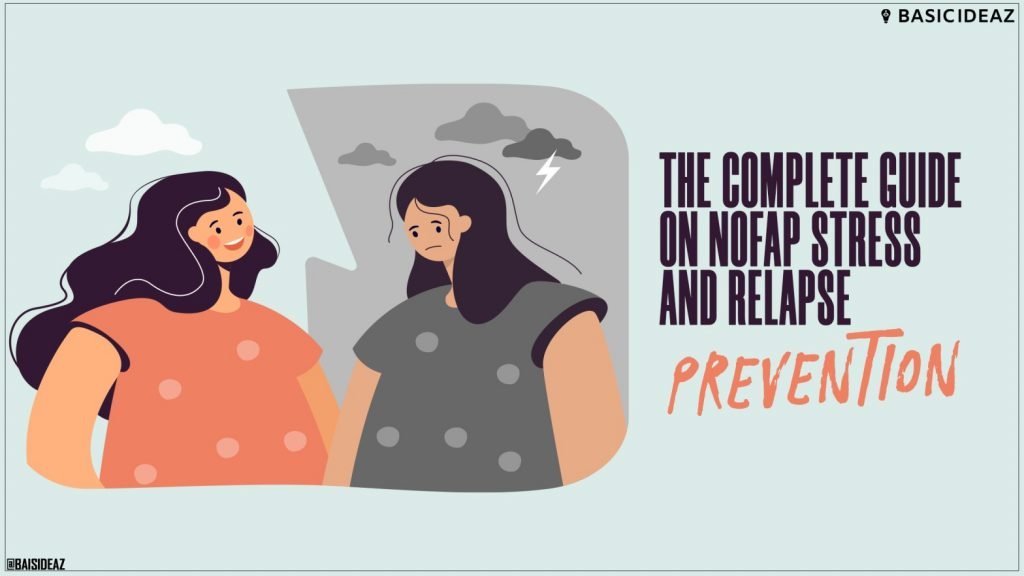

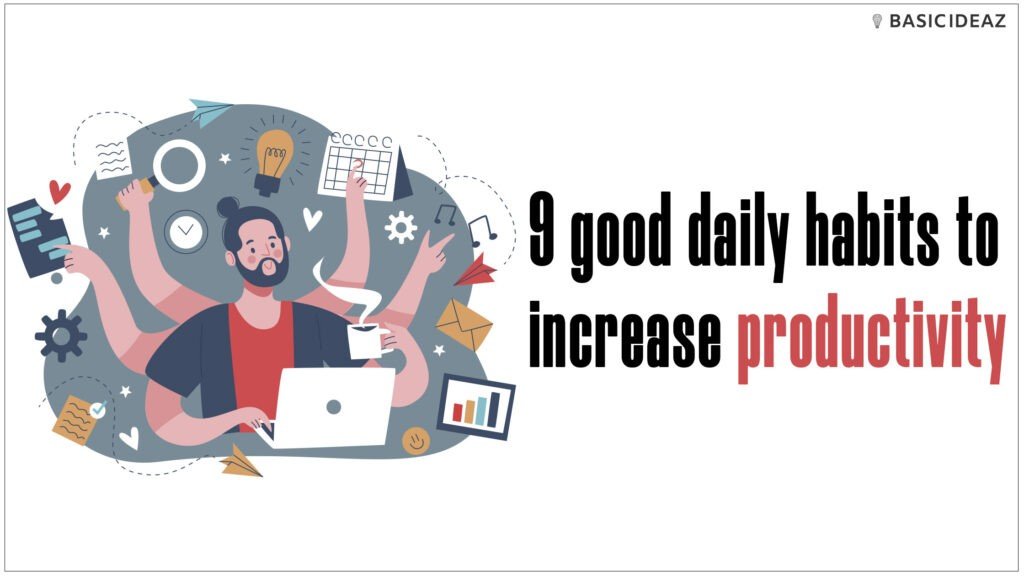

Comments are closed.